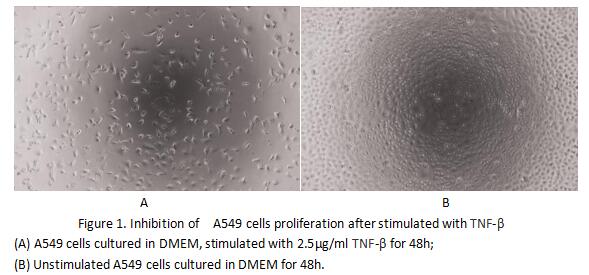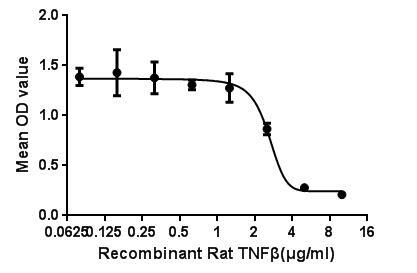Active Tumor Necrosis Factor Beta (TNFb)
LT; LTA; TNF-B; TNFSF1; Tumor Necrosis Factor Ligand Superfamily Member 1; Lymphotoxin Alpha
- Product No.UAPA134Ra02
- Organism SpeciesRattus norvegicus (Rat) Same name, Different species.
- Buffer FormulationPBS, pH7.4, containing 0.01% SKL, 5% Trehalose.
- TraitsFreeze-dried powder
- Purity> 90%
- Isoelectric Point10.2
- ApplicationsCell culture; Activity Assays.
- Download Instruction Manual
- UOM 10µg50µg 200µg 1mg 5mg
-
FOB
US$ 165
For more details, please contact local distributors!US$ 412
For more details, please contact local distributors! US$ 824
For more details, please contact local distributors! US$ 2472
For more details, please contact local distributors! US$ 6180
For more details, please contact local distributors!
ACTIVITY TEST of the Active Tumor Necrosis Factor Beta (TNFb)

TNF-β, a member of the tumor necrosis factor family, is a potent lymphoid factor that exerts cytotoxic effects on a wide range of tumor cells . The biological effects of TNF-β are very similar to TNF-α,due to the similarity of molecular structure and the receptors.As reported, TNF-α could inhibit the proliferation and induce apoptosis of A549 cells,therefore, A549 cells were seeded into triplicate wells of 96-well plates at a density of 4,000 cells/well with 5% serum standard DMEM including various concentrations of recombinant rat TNF-β. After incubated for 48h, cells were observed by inverted microscope and cell proliferation was measured by Cell Counting Kit-8 (CCK-8). Briefly, 10 µL of CCK-8 solution was added to each well of the plate, then the absorbance at 450 nm was measured using a microplate reader after incubating the plate for 2 hours at 37℃. Proliferation of A549 cells after incubation with TNF-β for 48h observed by inverted microscope was shown in Figure 1. Cell viability was assessed by CCK-8 (Cell Counting Kit-8 ) assay after incubation with recombinant mouse TNF-β for 48h. The result was shown in Figure 2. It was obvious that TNF-β significantly inhibit cell viability of A549 cells. The ED50 is 2.5μg/ml.

Figure 2. Inhibition of A549 cells proliferation after stimulated with TNF-β
USAGE of the Active Tumor Necrosis Factor Beta (TNFb)
Reconstitute in 10mM PBS (pH7.4) to a concentration of 0.1-1.0 mg/mL. Do not vortex.
STORAGE of the Active Tumor Necrosis Factor Beta (TNFb)
Avoid repeated freeze/thaw cycles. Store at 2-8°C for one month. Aliquot and store at -80°C for 12 months.
STABILITY of the Active Tumor Necrosis Factor Beta (TNFb)
The thermal stability is described by the loss rate. The loss rate was determined by accelerated thermal degradation test, that is, incubate the protein at 37°C for 48h, and no obvious degradation and precipitation were observed. The loss rate is less than 5% within the expiration date under appropriate storage condition.
INCREMENT SERVICES
BCA Protein Quantification Kit
Molecular Mass Marker for Protein
Monoclonal Antibody Customized Service
Polyclonal Antibody Customized Service
Protein Activity Test Experiment Service
Electrophoretic Mobility Shift Assay (EMSA) Experiment Service
Buffer
Lentivirus Packaging Experiment Service
Adenovirus Packaging Experiment Service
Real Time PCR Experimental Service
Spike RBD Protein (S-RBD)
Protein G
Protein A



